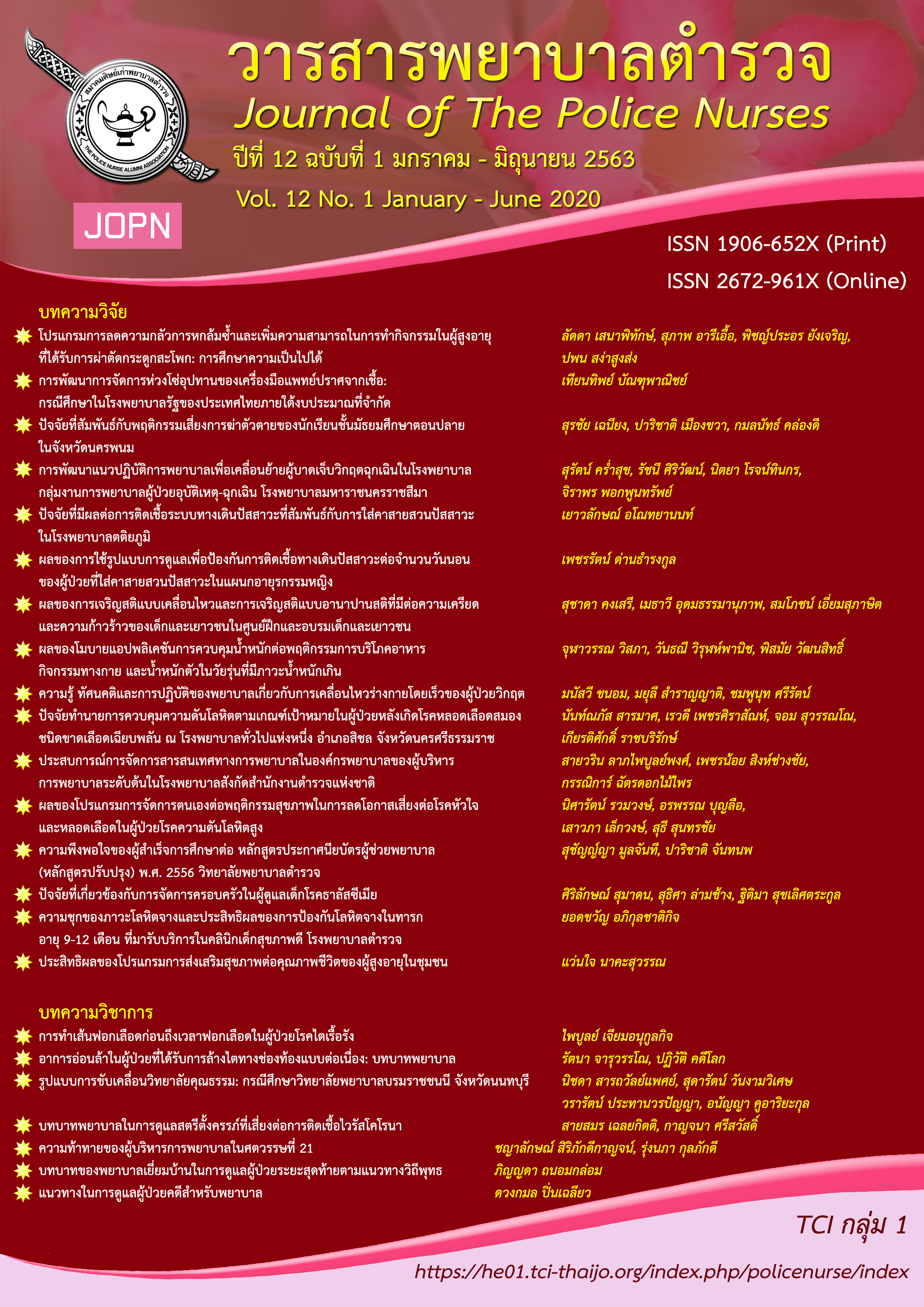THE EFFECTIVENESS OF HEALTH PROMOTION PROGRAM FOR THE ELDERLY ON THE QUALITY OF LIFE IN THE COMMUNITY
Keywords:
health promotion program, quality of life, elderlyAbstract
The purpose of this quasi-experimental research was to compare mean scores of quality of live in older people in total score and in each dimension as physiological, psychological, family and social relationship and environment before and after attending health promotion program. fourty elderly elderly club of Tumbon Thansumrit Nontaburi Province were the sample who fitted to expected characteristics of this study. Health Promotion Program was developed by applying self-efficacy theory and integrating four domains of quality of life (physical, mental, social, and environment).This study used “Quality of Life Questionnaires” for data collection which was developed by Suwat Mahatnirunkul and his colleagues in which originally from WHO and reliability was .84. Researcher collected data before and after attending “Health Promotion Promoting Program”. Implementation descriptive statistical analyses were percentage, mean scores, standard deviations, and Wilcoxon Signed Ranks Test was used to compare the scores of quality of life before and after experimentation.
The results of this study revealed that mean scores of elderly’s quality of life after attending “Health Promotion Program were significantly higher than before at .05 significant level in total and in physiological, environmental dimensions, excepted psychological and family social relationship at .05 significant level (p = .019).
Downloads
References
Achat, H., Kawachi, I., Levine, S., Berkey, C., Coakley, E., & Colditz, G. (1998). Social networks, stress and health-related quality of life. Quality of life research, 7(8), 735-750.
Bandura, A. (1977). Self-efficacy: Toward a unifying theory of behavioral change. Psychological Review, 84, 191-215.
Cheang, K. M., & Cheok, C. (2015). A 17-month review of the care mode service structure, and design of THRIVE, a community mental health initiative in Northern Singapore. East Asian Archives of Psychiatry, 25(4),168.
Chuawanlee, W. (1999). Effects of external rewards and self-efficacy on students' intrinsic motivation. Faculty of Education, Srinakharinwirot University. Foundation of Thai Gerontology Research and Development. Thai elderly population report 2008. Bangkok: TQP Co.
Cobb, S. (1976). Social support as a moderator of life stress. Psychosomatic Medicine, 38(5), 300–314. https://doi.org/10.1097/00006842-197609000-00003.
Foundation of Thai Gerontology Research and Development. (2009). Thai elderly population report 2009. Bangkok: TQP Co.
Guse, L. W. & Masesar, M. A. (1999). Quality of life and successful aging in long-term care: Perceptions of residents. Issues in Mental Health Nursing, 20, 527-539.
Jaenoobrum, S. (1998). Vision for the elderly and Non – formal education for Thai elderly. Bangkok: Nischin Advertising Group.
Lee, T. W., Ko, I. S., & Lee, K. J. (2006). Health promotion behaviors and quality of life among community-dwelling elderly in Korea: A cross-sectional survey. International journal of nursing studies, 43(3), 293-300.
Lemeshow, S., Hosmer, D. W., Klar, J., Lwanga, S. K., & World Health Organization. (1990). Adequacy of sample size in health studies. Chichester: Wiley.
Nanthamongkolchai, S. (2015). Quality of life among elderly people with chronic diseases in Ubon Ratchathani province. Journal of Public Health Special Issue, 18-29.
Qunnapiruk, L., Ronnarithivichai, C., & Ucharattana, P. (2005). Quality of life among elderly: The meta-analysis. Journal of Gerontology and Geriatric Medicine, 69(1), 2-12.
Saesiew, N. Vanindananda, N., & Choochom, O. (2012). The psychosocial adjustments and situational conditions as correlates of the quality of life in midlife adulthood. Journal of Psycho-Behavioral Science: Thai Behavioral System Journal of Behavioral Science for Development 1(1), 1-13.
Sarnsang, C. (2018). Quality of life and health-promoting behavior of the elderly in Thungkhowpuang Sub-district, Chiang Dao District, Chiangmai Province (Master of public health). Faculty of Graduate Studies, Chiangmai Rajabhat University, Chiangmai.
Sullivan, L. W. (1992). Health promotion and disease prevention. Medical Education, 26, 175-177.
Tantalanukul, S., Rattanasak, S., Sengpanich, C., Srisung., W., & Tungkawanich, T. (2016). The effect of simulation-based learning on the ability development ofprimary medical care practicum of nursing students at Boromarajonani College of Nursing Uttaradit. Boromarajonani College of Nursing, Uttaradit Journal, 8(1), 49-58.
The National Committee on the Elderly he National Committee on the Elderly. (2009). The 2nd National Plan on the Elderly: NPE (2002 – 2021).
Downloads
Published
How to Cite
Issue
Section
License
ผลงานที่ได้ตีพิมพ์แล้วจะเป็นลิขสิทธิ์ของวารสารพยาบาลตำรวจ















